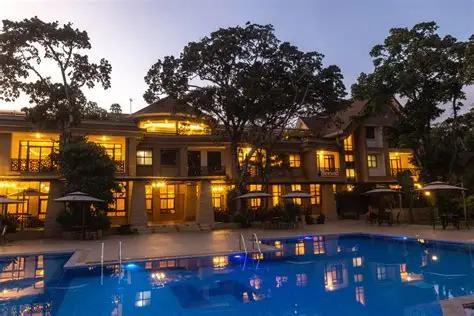Africa-Press – Seychelles. My room did not face a parking lot or a concrete courtyard. From my kingsize bed, I had a clear view of monkeys flirting on the fence, sunlight filtering through palms leaves, and birds chirping softly in the morning. The remarkable silence is not the kind forced by double-glazed windows, but the natural quiet of a place that knows how to be still.
At Hermosa Garden Hotel & Spa , birds picked melodies from treetops as we seeped air filled with rosemary and lavender. Tea brewed from Kericho green slopes came steaming, served with roasted njugu (peanuts) that tasted like conversation. Phones lay supine on tables. Guests trudged as though the land taught them how to place their footsteps.
A garden path led nowhere in particular. You walked for no reason other than to feel the earth. It was not the Nairobi I had known, the city of speed, briefcases, and polished shoes rushing through Kenyatta Avenue. This was Karen, the city’s green lung, where roads carved with grace and homes hid behind bougainvillea canopies.
See, when I landed at Jomo Kenyatta International Airport, my body still carried Kampala’s chaotic pulse,dust, boda-boda horns, and the relentless rhythm of deadlines.
Phillip, the hotel chauffeur, waited with a placard, but his true service was conversation. As we drove, he introduced Karen like an old friend, its colonial-era homes draped in ivy, art studios tucked among trees, and residents who chose foliage over fashion.
By the time we approached Hermosa, I had already eased in. The gates opened like an embrace, hedges trimmed meticulously, blossomed spilling colour. A guard greeted us with practiced grace, but it was the aura- unhurried , that welcomed us.
Elizabeth Mungai, co-owner of Hermosa, stood under a jacaranda tree and spoke with quiet conviction.
“We refused to cut trees,” she said with the certainty of one who understood legacy. “In fact, we planted more.”
Hermosa, she explained, was not built, it was grown. In Uganda, we call ourselves the Pearl of Africa, and rightly so. But like many African cities, rapid urbanisation is cracking that shell. Rooftop bars rise as courtyards shrink.
Lakeshore properties in Entebbe fence off the very lakes they claim to celebrate. In Jinja, riverbanks are parcelled faster than papyrus can regenerate.
Hermosa, quietly preaches a different gospel, that hospitality begins not with architecture but with environmental humility. The land here is not a blank canvas to build on; it is a co-host. It is a timely reminder to nurture nature when sustainability, conservation, and green living are becoming urgent global conversations.
Inside, the reception carried warmth with attentive staff. The architect and interior designer must have earned their paychecks, maroon-hued chairs, soft carpets, and art that celebrated Kenyan identity. Everything felt purposefully placed, not to impress but to belong. A painting of Lamu hang in the lounge, its strokes soft and wistful, more than decoration.
Cuisine and the wildlife
And then, the food. Chef James, whose hands carry 32 years of culinary travel, treats food as narrative. He sources vegetables from Kiambu farms, seafood from Kenya coast, and herbs from a small garden behind the kitchen.
“Food should taste like where it came from,” he said. It made me think of Kabale sweet potatoes, Bushenyi matooke, and Nile tilapia from Jinja, ingredients that, if treated with such reverence, could tell Uganda’s own culinary story with pride.
Karen’s proximity to iconic attractions adds a layer of adventure. Nairobi National Park lies just a short drive away, the world’s only wildlife reserve sharing a skyline with a capital city. There, rhinos graze beneath office towers, and lions patrol a fragile border between the wild and the urban.
Nearby, Giraffe Manor invites gentle giants to lower their heads to human eye level, blurring the line between wilderness and intimacy. The suburb also offers Nairobi’s best malls and galleries, pockets of sophistication without sacrificing calm.
Tour time
On a city tour one afternoon, the guide turned history into conversation. It was a public holiday, the streets relaxed. I watched Nairobi’s old architecture conversing with its new skyline, a reminder that progress need not mean erasure. Yet, after every excursion, returning to Hermosa felt like exhaling after holding my breath too long. Afternoons drifted easily into spa hours.
At the Olive Spa, the world untangled itself. Steam wrapped around tired shoulders; the sauna hummed with low, calming heat. The massage felt like a lullaby moment.
Outside, monkeys staged theatre around the pool, sipping water like aristocrats before caretakers gently ushered them away.
Guests chuckled, not with irritation but amusement, as though they too had surrendered to the rhythm of the place. Evenings fell in shades of amber. A bonfire crackled softly as darkness arrived without rush. Guests gathered gradually, some with tea, others with inaudible conversation. Flames reflected in wine glasses. The night carried a calm that needed no curated music or staged performance.
Hermosa let fire, wind, and laughter do the entertaining. And I thought again of Ugandan hospitality, how deeply warm our people are, yet how often our developments race ahead of their own soul. We do not lack generosity; we lack patience with place. Hermosa demonstrates that hospitality is not a checklist of amenities but an atmosphere, the space between trees, the pause between conversations, the breath between arrival and belonging.
Legacy
On my final morning, bags packed, I lingered under the greenery one last time. A bird stood on the fence, still as a keeper of the moment. Mungai walked by, inspecting the gardens before attending to guests. I asked what she hoped people would carry away from Hermosa. She did not look at the buildings but at the trees.
“That people remember how good it feels when nature is allowed to live,” she said.
In that instant, I understood: Hermosa is not just a hotel. It is a reminder that the future of East African hospitality will not be decided by how high we build, but by how deeply we root.
Because long after glass towers fade from fashion, it will be the sound of birds at dawn, the shade of an old jacaranda, and the feeling of breathing without rush that travellers return for.
Development should not silence the birds. Hospitality should not begin where nature ends. In the quiet green of Hermosa Garden Hotel & Spa, I did not just rest, I relearned how to arrive.
For More News And Analysis About Seychelles Follow Africa-Press






